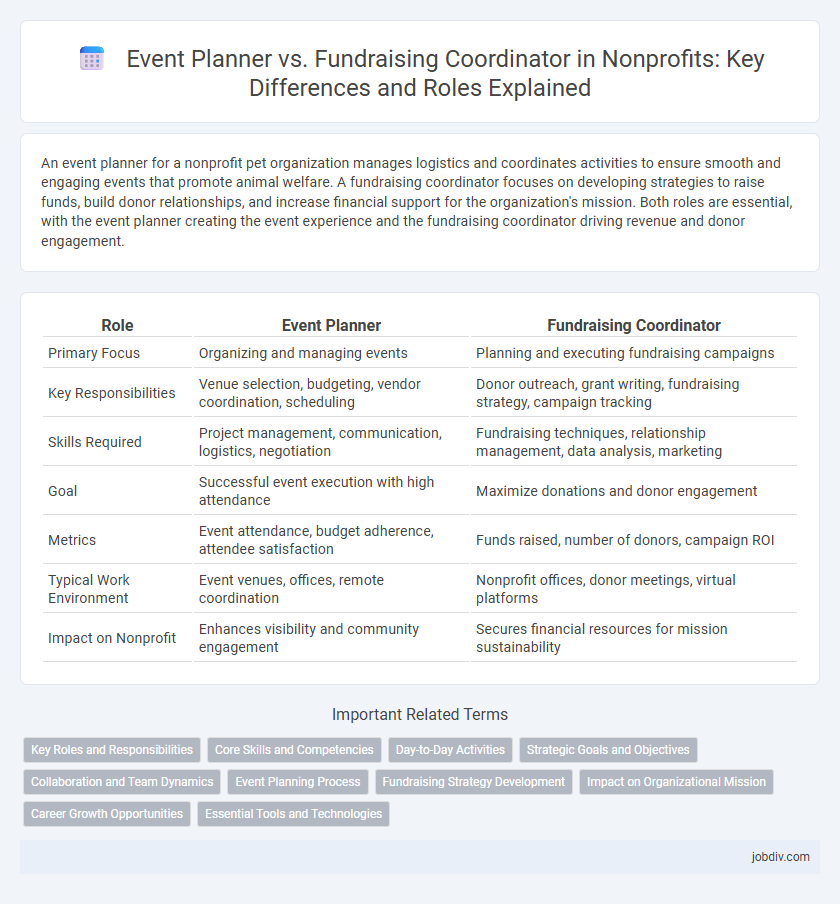An event planner for a nonprofit pet organization manages logistics and coordinates activities to ensure smooth and engaging events that promote animal welfare. A fundraising coordinator focuses on developing strategies to raise funds, build donor relationships, and increase financial support for the organization's mission. Both roles are essential, with the event planner creating the event experience and the fundraising coordinator driving revenue and donor engagement.
Table of Comparison
| Role | Event Planner | Fundraising Coordinator |
|---|---|---|
| Primary Focus | Organizing and managing events | Planning and executing fundraising campaigns |
| Key Responsibilities | Venue selection, budgeting, vendor coordination, scheduling | Donor outreach, grant writing, fundraising strategy, campaign tracking |
| Skills Required | Project management, communication, logistics, negotiation | Fundraising techniques, relationship management, data analysis, marketing |
| Goal | Successful event execution with high attendance | Maximize donations and donor engagement |
| Metrics | Event attendance, budget adherence, attendee satisfaction | Funds raised, number of donors, campaign ROI |
| Typical Work Environment | Event venues, offices, remote coordination | Nonprofit offices, donor meetings, virtual platforms |
| Impact on Nonprofit | Enhances visibility and community engagement | Secures financial resources for mission sustainability |
Key Roles and Responsibilities
Event Planners in nonprofits specialize in organizing logistics, coordinating venues, managing vendors, and ensuring smooth execution of events that engage and inspire donors. Fundraising Coordinators focus on developing and implementing fundraising strategies, cultivating donor relationships, and tracking donation progress to maximize revenue growth. Both roles are critical for successful campaigns, with Event Planners enhancing experience and Fundraising Coordinators driving financial support.
Core Skills and Competencies
Event planners in nonprofits excel in project management, logistical coordination, and vendor negotiation, ensuring seamless execution of events that align with organizational goals. Fundraising coordinators specialize in donor relations, campaign strategy, and data analysis to maximize funding opportunities and donor engagement. Both roles require strong communication, time management, and problem-solving skills tailored to nonprofit environments.
Day-to-Day Activities
Event planners in nonprofits coordinate logistics, venue selection, vendor management, and attendee experience to ensure smooth event execution. Fundraising coordinators focus on donor outreach, campaign strategy, grant writing, and managing fundraising data to maximize contributions. Both roles collaborate closely but distinctly manage operational versus fundraising-specific tasks.
Strategic Goals and Objectives
Event planners in nonprofits focus on coordinating logistics and managing event execution to support community engagement and donor retention. Fundraising coordinators strategically develop campaigns and cultivate donor relationships to meet financial targets and long-term organizational goals. Both roles align with the nonprofit's mission by driving fundraising success and enhancing stakeholder involvement.
Collaboration and Team Dynamics
Event planners and fundraising coordinators collaborate closely to ensure successful nonprofit campaigns by aligning event logistics with fundraising goals. Clear communication and role delineation between these roles enhance team dynamics, fostering a cohesive environment where event execution supports donor engagement and revenue generation. Integrating data-driven strategies and shared objectives strengthens collaboration, maximizing impact and organizational effectiveness.
Event Planning Process
Event planners in nonprofits oversee the entire event planning process, managing logistics such as venue selection, vendor coordination, and timeline development to ensure seamless execution. Fundraising coordinators focus specifically on organizing events aimed at generating financial support, strategizing donor engagement, sponsorship acquisition, and donation tracking. Both roles require collaboration but differ in scope, with event planners handling broader event details and fundraising coordinators emphasizing donor-focused event outcomes.
Fundraising Strategy Development
Fundraising Coordinators specialize in developing targeted fundraising strategies that align with nonprofit goals, leveraging donor data and market trends to maximize revenue potential. They design and implement campaigns, cultivate donor relationships, and analyze fundraising outcomes to optimize future efforts. Event Planners primarily manage logistics and execution of fundraising events but rely on Fundraising Coordinators for strategic guidance to achieve financial objectives.
Impact on Organizational Mission
Event planners in nonprofits specialize in organizing events that maximize donor engagement and brand visibility, directly boosting fundraising outcomes and volunteer recruitment. Fundraising coordinators strategically manage campaigns and donor relationships to secure essential funds, ensuring long-term financial stability and mission-driven program expansion. Both roles are pivotal in advancing the nonprofit's mission by aligning event success with fundraising goals to amplify overall impact.
Career Growth Opportunities
Event Planners in nonprofit organizations often gain diverse project management skills and build extensive networks, enhancing their potential for leadership roles in program development or community engagement. Fundraising Coordinators develop expertise in donor relations and financial strategy, positioning them for advancement into major gifts management or development director positions. Both career paths offer opportunities for specialization and upward mobility within nonprofit management, depending on individual strengths and organizational needs.
Essential Tools and Technologies
Event planners utilize project management software, event registration platforms, and communication tools like Slack to coordinate logistics and ensure seamless event execution. Fundraising coordinators rely on donor management systems, crowdfunding platforms, and data analytics tools to track donations and optimize campaign strategies. Both roles benefit from CRM software integration to maintain stakeholder relationships and streamline organizational workflows.
Event Planner vs Fundraising Coordinator Infographic

 jobdiv.com
jobdiv.com